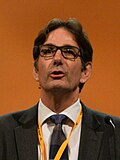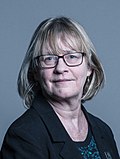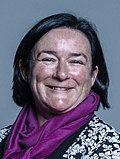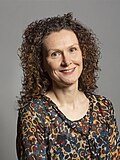Frontbench Team of Ed Davey | |
|---|---|
| 2020–present | |
 | |
| Date formed | 27 August 2020 |
| People and organisations | |
| Monarch | Elizabeth II Charles III |
| Leader | Ed Davey |
| Deputy Leader | Daisy Cooper |
| Member party | |
| Status in legislature | Third party 72 / 650 (11%) (As of July 2024) 11 / 650 (2%) (2020 - 2024) |
| History | |
| Legislature terms | 2019 UK Parliament 2024 UK Parliament |
| Incoming formation | 2019 General Election |
| Predecessor | Frontbench Team of Jo Swinson |
Ed Davey was appointed as Acting Leader of the Liberal Democrats following the resignation of Jo Swinson. Davey announced his first frontbench team as Acting Leader in January 2020. [1]
Contents
- Current frontbench team
- Since September 2025
- Other roles and spokespeople
- Frontbench team history
- January 2020 – August 2020
- September 2020 – July 2022
- July 2022 – October 2024
- October 2024 – September 2025
- September 2025 – present
- See also
- References
- External links
Davey was elected permanent Leader on 27 August 2020 and assembled a new frontbench team in the following days. After the 2024 general election, Davey's frontbench team became the second largest opposition party to the governing Labour Party, behind the Sunak shadow cabinet.
On 18 September 2024, following the party conference, Davey announced a new 33-member frontbench team, with new members taking frontbench roles. This left 39 backbench MPs, more than twice the number of Liberal Democrat MPs prior to the election. This was also subsequent to former frontbench members Layla Moran, Alistair Carmichael, and Jamie Stone standing down from the frontbench after being elected to chair parliamentary select committees. [2]
The frontbench was reshuffled in September 2025 following the Liberal Democrat Conference in Bournemouth. [3]
| Frontbench Teams since 1997 |
|---|
| Ashdown Team (1997–1999) |
| Kennedy Team (1999–2006) |
| Campbell Team (2006–2007) |
| First Cable Team (2007) |
| Clegg Team (2007–2010) |
| General Election Cabinet (2015) |
| Farron Team (2015–2017) |
| Second Cable Team (2017–2019) |
| Swinson Team (2019) |
| Davey Team (2020–present) |























































































